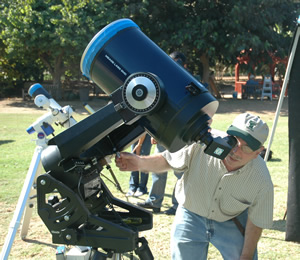Take a Long Look
Arboretum Celebrates Galileo's First Look Through a Telescope

Steve Karl, a microscopist in Biological Science, viewed the Mercury transit back in the fall 2006 using a 10-inch telescope - one of three set up for visitors to the Fullerton Arboretum. The telescopes will be set up again April 4 for public viewing during "100 Hours of Astronomy - An Event 400 Years in the Making." Photo by Patrick O'Donnell
What:
The Fullerton Arboretum and Cal State Fullerton’s Department of Biological Science celebrate the 400th anniversary of Galileo looking through a telescope he devised to study the heavens, with “100 Hours of Astronomy — An Event 400 Years in the Making.”
When:
Saturday, April 4
Noon – 9 p.m.
Where:
Cittadin Plaza, Fullerton Arboretum, 1900 Associated Rd., Fullerton, 92831
Cost:
Free
Additional:
The daylong festivities will include a science center, interactive astronomical displays, educational materials and sidewalk astronomy events. The organizers’ goal is to have as many visitors as possible look through the telescopes. The Fullerton Arboretum will offer both daytime and nighttime telescope viewing — primary targets are the moon and Saturn — over a nine-hour period as part of the worldwide “100 hours” event organized by the International Astronomical Union.
Arboretum:
The Fullerton Arboretum is a 26-acre botanical garden located on the northeast corner of Cal State Fullerton. The preserve, which is open to the public daily from 8 a.m. to 4:45 p.m., features plants from around the world. Included on the grounds are the Orange County Agriculture and Nikkei Heritage Museum and the historic Heritage House, the restored residence and medical office of Orange County pioneer physician George C. Clark. More information is available online at fullertonarboretum.org or by phone at 657-278-3407.
Media Contacts:
Steve Karl, Biological Science, 657-278-2565 or skarl@fullerton.edu
Russ L. Hudson, Public Affairs, 657-278-4007 or rhudson@fullerton.edu
